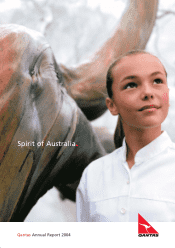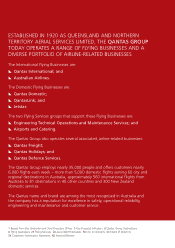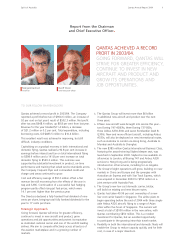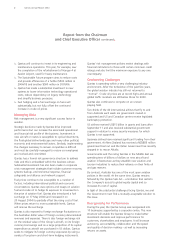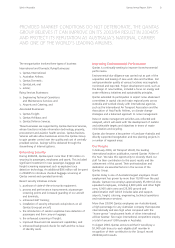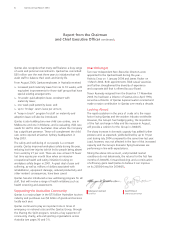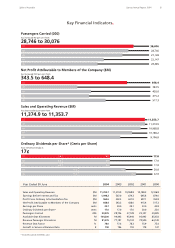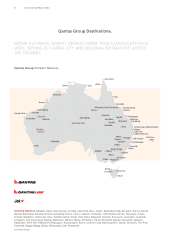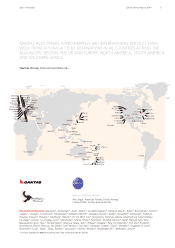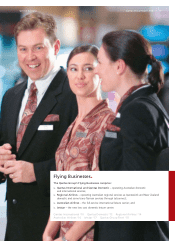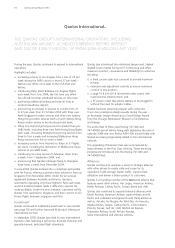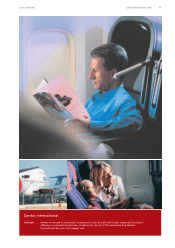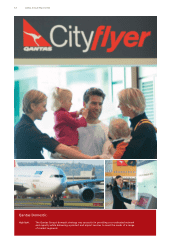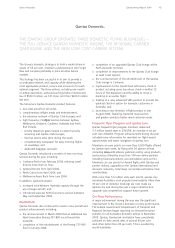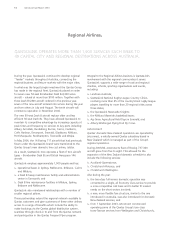Qantas 2004 Annual Report Download - page 6
Download and view the complete annual report
Please find page 6 of the 2004 Qantas annual report below. You can navigate through the pages in the report by either clicking on the pages listed below, or by using the keyword search tool below to find specific information within the annual report.
4Qantas Annual Report 2004
Qantas also recognises that many staff balance a busy range
of work and personal commitments. Qantas has committed
$50 million over the next three years to initiatives that will
assist staff to balance their work and family life.
From August 2004, Qantas employees in Australia received:
increased paid maternity leave from six to 10 weeks, with
equivalent improvements for those staff groups that have
special existing arrangements;
10 weeks’ paid adoption leave consistent with
maternity leave;
one week paid paternity leave; and
up to 10 days’ carer’s leave per annum;
A “keep in touch“ program for staff on maternity and
adoption leave will also be introduced.
Qantas is also building two new child care centres, one in
Melbourne and one in Brisbane, and is evaluating child care
needs for staff in other Australian cities where the Company
has a significant presence. These will complement the child
care centre opened at Qantas’ Sydney headquarters in
May 2003.
The safety and well-being of our people is a constant
priority. Qantas improved workplace safety during the year,
reducing lost time injuries (which led to people being absent
from work) by 27 per cent. There are now at least 70 fewer
lost time injuries per month than when an intensive
occupational health and safety initiative focusing on
workplace safety began in 2001. A great deal of pain and
suffering, as well as millions of dollars associated with
rehabilitation, equipment damage, reduced productivity and
other incident consequences, have been saved.
Qantas has also introduced a new well-being program for all
staff, that will involve a range of health initiatives such as
health screening and assessments.
Supporting the Australian Community
Qantas is a major player in the $73 billion Australian tourism
industry and purchases over $2 billion of goods and services
locally each year.
Qantas continues to play an important role in times of
emergency or national crisis and the Qantas Group, through
the Sharing the Spirit program, remains a key supporter of
community, charity, arts and sporting organisations across
Australia (see pages 30 and 31).
Board Changes
Two new Independent Non-Executive Directors were
appointed to the Qantas Board during the year –
Patricia Cross on 1 January 2004 and James Packer on
1 March 2004. Both appointments filled casual vacancies
and further strengthened the diversity of experience
and corporate skill that is offered by your Board.
Trevor Kennedy resigned from the Board on 17 November
2003. He had been a Director of Qantas since April 1994,
served as a Director of Qantas Superannuation Limited and
made a major contribution to Qantas over nearly a decade.
Looking Ahead
The rapid escalation in the price of crude oil is the major
factor facing Qantas and the aviation industry worldwide.
However, the Group’s fuel hedging policy, the imposition
of the fuel surcharge in May and the increase in August,
will provide a cushion for the Group in 2004/05.
The sharp increase in domestic capacity has added further
pressure and, as expected, yields declined by up to 10 per
cent during July 2004 compared to the same time last year.
Load, however, was not affected in the face of this increased
capacity and the Group’s domestic flying businesses are
performing in line with expectations.
Taking the above into account, and provided market
conditions do not deteriorate, the returns for the first few
months of 2004/05, forward bookings and a continuation
of efficiency gains lead Qantas to believe it can improve
on its 2003/04 result in 2004/05
Margaret Jackson
Chairman
Geoff Dixon
Chief Executive Officer
Report from the Chairman
and Chief Executive Officer continued

